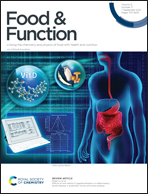Glycopeptides from Paecilomyces sinensis ameliorate ethanol-induced gastric ulcers via anti-inflammation and the miR-9-5p-MEK/ERK signaling pathway
Abstract
The aim of this study was to investigate the immunomodulatory effect and mechanism of the glycopeptides from Paecilomyces sinensis (CPS-II) on ethanol induced ulcers in mice. In this study, histopathological evaluation (H&E staining) and the gastric ulcer score, ulcer index, total acid secretion and gastric pH value were used to determine the anti-ulcer activity. The expression levels of interleukin (IL)-6, interleukin (IL)-10 and tumor necrosis factor-α (TNF-α) were detected by ELISA. The contents of superoxide dismutase (SOD), malondialdehyde (MDA) and epidermal growth factor (PEG2) in serum were measured according to the instructions for the reagents. Western blotting was used to detect the effect of CPS-II on the MEK/ERK pathway. The results showed that CPS-II could inhibit the ulcer score and ulcer index compared with the disease control group. CPS-II could significantly increase gastric pH and decrease gastric acid secretion in mice. The ELISA analysis showed that the expression levels of IL-6 and TNF-α in the CPS-II treatment group were significantly decreased, while the expression levels of IL-10 were significantly increased in the CPS-II treatment group. In the resveratrol treatment group, the content of MDA in serum was decreased, and the level of PEG2 and the activity of SOD in serum were significantly increased, which indicated that CPS-II has immunoregulation and anti-ulcer properties. The CPS-II treatment group could reduce the expression level of miR-9-5p in gastric tissue. pEGFR had been identified as a potential target of miR-9-5p. Western blot analysis showed that CPS-II could up-regulate the relative protein expression of pEGFR/EGFR, pRaf/Raf, pMEK/MEK, pERK/ERK, and ZO-1. The results showed that CPS-II could reduce oxidative stress and inflammatory response by regulating the miR-9-5p-MEK/ERK signaling pathway, thus protecting the gastric mucosa and improving stress gastric ulcers.



 Please wait while we load your content...
Please wait while we load your content...